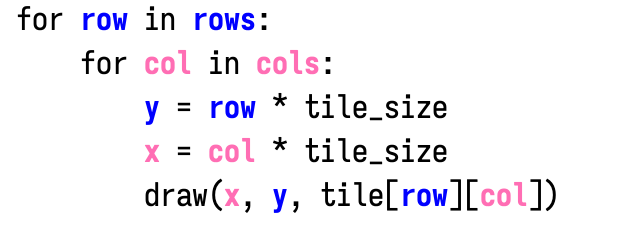Road Archaeology, part 1 #
While on road trips I notice sometimes there are places where a road will deviate from the path I expect it to take. I take a note of it and then investigate what happened there. Usually there's some geography or history involved. Take I-5 in Northern California for example. There's a straight segment from Dunnigan CA to Williams CA:
Labels: transportation
Emacs: marking text #
Although I primarily use Emacs, I love the idea of vim text objects, and wanted to incorporate them into my editing. The Kakoune introduction explains that vim uses verb first, noun second for its commands, whereas Kakoune uses noun first, verb second. I wrote a blog post about why I prefer noun-verb over verb-noun, not only in text editors but also in games and other applications.
Labels: emacs
Axial name highlighting #
I like to try various things out in my editor to see if they're useful. Most are interesting but not useful. On my guide to hexagons I use colors for the three hexagon axes (q, r, s). I thought it might be cool to do something similar in the text editor, for x and y:

Labels: emacs, programming
Beer mode and coffee mode #
Over the years I've mentioned to people that I work in two modes:
- Beer Mode 🍺
- I'm relaxed and make connections between many different ideas. I can come up with new creative ideas.
- Coffee Mode ☕
- I'm focused and make progress on my work. I am productive and can complete existing projects.
I assumed that the names "Beer Mode" and "Coffee Mode" are something I saw somewhere. But then when I went looking for it, I couldn't find any source. It seems to be called "open mode" and "closed mode" by others. So it's possible that these terms are something I came up with! I mentioned it on Twitter and David Perell wrote a page about it.
I had a similar experience when I said Dreams are malleable — I assumed I had seen this somewhere but I couldn't find a good source, so it's possible my brain came up with that phrase too. And also possibly this one. I say lots of off-the-cuff things (in beer mode) and don't remember most of them.
Non-consensual personalization on the other hand is a phrase I carefully thought about.
Microtunnels #
I'm a big fan of tunnels. I've previously blogged about tunnels for package delivery and tunnels for infrastructure like electricity, internet, water, etc. But I think tunnels might also be useful at a very small scale, within my yard. If we had flexible tunnel boring machines that could dig 4mm diameter tunnels:
- For each plant with invasive root systems (bamboo, blackberry) I'd tell the machine to follow the roots and set fire to them 🔥
- For each tree I'd tell the machine to follow the roots and deliver nutrients and dislodge pests 🐛
- For drough prone areas I'd tell the machine to dig a network of tunnels that could absorb precious rainwater into the ground so that it doesn't run off 🏜
I expect the small diameter tunnels would be much easier to dig but at the same time the flexible paths would be harder to build robots for.
[Terminology note: microtunneling already refers to 40mm tunnels much larger than these, and nanotunneling already refers to 40nm tunnels much smaller than these, but micro seems like a closer match]
Labels: future
Non-consensual personalization #
I want to personalize things I use. I want to change the settings. I want to change the colors, the design, the functionality. It used to be more common that I could do this type of thing. But these days, it seems like companies want to use "AI" to personalize things without my consent. Instead of asking me what I want, they decide what I want.
On Netflix, I'd love to change the order of the various categories. But I can't. Netflix decides for me what the order should be. I no longer have a choice. This kind of thing seems to be happening across products and services. It's not only commercial software, but also places like Linux (edit: I mean the ecosystem, not the kernel) and Firefox (edit: I was thinking of the extensions and ui). And it's not only personalization. It used to be when I misspelled something on Google, the page would ask me "did I mean:". But these days, Google decides for me what I meant. It just goes ahead and changes the search words without asking.
One very surprising exception is Mac OS, which after decades of only allowing blue controls added the choice of color. But in most ways MacOS doesn't allow me to personalize things.
These companies might argue that it's for my benefit or that it's been studied or whatever, but it doesn't matter. There's a big difference between me choosing to paint my room green and a corporation coming into my house in the middle of the night and painting my room green.
Update: [2022-02-04] This post unexpectedly got on hackernews; see the comments.
Roman numerals and currency #
I find that Roman Numerals didn't "click" for me. At an intellectual level, I understand how they work. But they felt unintuitive. Until now!
